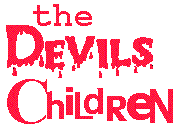

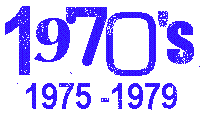
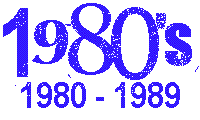
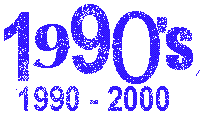
background face of roxy punks
ICONS
ROTTEN VICIOUS POLYSTYRENE
RAT SCABIES CAPTAIN SENSIBLE DAVE VANIAN JOHNNY THUNDERS CHAOTIC BASS ARRI UP JOHNNY MOPED TV SMITH GAYE ADVERT LAURIE DRIVER HOWARD PICKUP BILLY IDOL GENE OCTOBER PALMOLIVE LAURA LOGIC JERRY ATTRICK JANE SUCK SLIMEY TOAD DEE GENERATE ANDY BLADE
DERBY CRASH JOE STRUMMER SUE CATWOMAN SIOUXSIE SIOUX
STEVE IGNORANT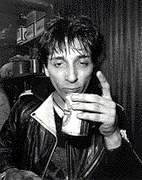

When we were told it was gig time, I went running down the steep stairs toward the stage. I wasn't thinking about anything but getting out there. I turned a corner on the steps and ran full on into Dave Vanian, The Damned's singer. He was dressed to the hilt in his vampire gear. I nearly knocked him over. I felt like such a jerk. He was cool though. He extended his hand & said 'hello'. I was tripping out on that as I went down the stairs. A guy who's records I had listened to for years and all I could do was nearly send him flying down a flight of stairs".
HENRY ROLLINS (ROLLINS BAND) - 1994.
"The Damned are a very dirty version of The Bay City Rollers ... or Eddie & The Hot Rods with make-up".
JOHNNY ROTTEN (SEX PISTOLS) - JUNE 1977.
nicked from Danmed site
Punk: How was it for you?
Twenty-five years ago, punk hit Britain. Dave Simpson and Will Hodgkinson ask the people who were there what it meant - and whether it still matters
Friday August 10, 2001
The Guardian
Jon Savage
London's Outrage fanzine and Sounds writer
In 1975, everything was shit. London looked like a rubbish tip, the clothes were disgusting and everybody was listening to Abba and the Carpenters, and all that stuff that is retrospectively fashionable. The NME was promoting these awful groups like Racing Cars. In July 1976, the first Ramones album became the Holy Bible. It was obvious that soon there would be people in Britain making that kind of noise.
I saw the Clash at the Fulham Town Hall and I was stunned. At that point I was completely alienated and felt very angry about everything. Nobody ever thinks this about the Clash, but I detected a lot of pain and hurt. Then I saw the Pistols and they became more challenging on every level. They were a spectacle and seemed to challenge everything you thought. I was attracted and repelled.
Punk took over my life. I shed all my old friends and made new friends among fellow outcasts. In your 20s, there's a great need to be part of a fanatical sect, and you weren't allowed to like anything else, at least for a year. There were a lot of pillocks. I loathed the Jam with their stupid suits, and Sham 69's skinheads, and the Stranglers. Jean-Jacques Burnel attacked me after I slated their second album.
Records could have a huge impact in your little world and make little impact on the charts at all. It was very different from today, where everybody wants to be mainstream. People didn't love the media. If you look at footage of punk rock concerts, punks were giving the finger to the camera. It's all stage school now: so dreary.
• Jon Savage's book on punk, England's Dreaming, has been reissued. He is 47.
Glen Matlock
Bassist, the Sex Pistols
I was working in a department store, but I got loaded one night at the Lyceum and forgot to put the wages dockets in. The store was in chaos and I knew I was finished. The next day I got a job at Malcolm McLaren's shop on the King's Road, Let It Rock, later called Sex, and Steve Jones and Paul Cook started coming in. Steve was a petty thief, with his mate Wally, but it was suggested that instead of nicking anything else they nick guitars and form a group. We pestered Malcolm to become the manager, and about a year later John (Rotten) walked into the shop, and we changed the name from Swankers or Strand into the Sex Pistols.
We loved the Faces, but John absolutely abhorred everything we dug. The friction was good. At one of the early gigs, the curtain went back and Steve was having a piss onstage. We stuck out like a sore thumb, but we thought "punk" was a loser term.
My most vivid memory is being on the Bill Grundy show on ITV, December 1976. Grundy was a big interviewer at the time, the first person to interview the Beatles. He'd done Elizabeth Taylor, too. We got the show because Queen pulled out at the last minute. He really didn't want to interview us, and he took it out on us, going: "Say something outrageous."
It all went off. When we finished, I wanted to go and have another drink in the green room. Malcolm just grabbed me and threw me into the limo EMI had provided. As we pulled off, half a dozen cops turned up with their truncheons hanging out. We waved at them nicely as we drove off. It ended Grundy's career and kick-started ours. The next day there were 500 bands forming across the country.
• Glen Matlock records and tours under his own name. He is 44.
Toyah Willcox
Actress and singer
In September 1976 I saw the Sex Pistols play Bogart's in Birmingham and it was fantastic. I'd already dyed my hair bright pink and I was wearing binliners, because I couldn't afford clothes. I'd been ridiculed for the way I looked, but I walked into this club and suddenly I wasn't alone any more.
I moved to London to work at the National Theatre and spent my first wage packet on Patti Smith, Bowie and Velvets records. An actor introduced me to Derek Jarman, who was making the Jubilee punk film. His flat was full of semi-naked young boys. I was very tomboyish, didn't do drugs, was a virgin and couldn't deal with social situations. But I was determined to be a star. Derek loved this. But he didn't exploit me, unlike the McLaren set who filmed me at the Sex shop, and I had an enormous punch up with Tracey who worked there.
There was a lot of fighting. My band were predominantly Jewish. In Bath the NF started sieg-heiling and the police eventually had to get us out through a window in the gents. But it was the most fantastic part of my life. Punk helped musical fringes get attention. Stuff like Nirvana could never have happened without it. But the way the corporates are going now, you're only gonna get the Top 30 and that's scary. It's pissing on punk's legacy.
• Toyah Willcox is in The Shagaround at the Soho Theatre, London. She is 43.
Tony Parsons
Journalist, NME
In the spring of 1976 I was working in Gordon's Gin distillery on City Road in London. Me and my colleague, a nice old hippie called Ray, objected to our 12-hour shifts of 8pm to 8am so we would go off and look for anywhere that was open, and there wasn't much - it was either Dunkin' Donuts or the 100 Club. I had been into the Beatles and the Stones and then Bowie, and had got sick of going to huge stadium concerts. Me and Ray walked into the 100 Club and there was Siouxsie Sioux in stockings, a whip and Clockwork Orange make-up, bringing porno Soho into music. The other bands playing were the Clash and the Sex Pistols. Ray wasn't so sure as he was into Crosby, Stills and Nash, but it wasn't exclusive and nobody paid any attention to him. The mood was excited to violent. That night, Sid Vicious whipped my future colleague Nick Kent with a bicycle chain, but Sid was a pathetic character, a real bully who only picked on people who wouldn't do anything to him.
A lot of people felt that their chance had come. At first there was no audience - you'd go to see the Jam and six people would be watching them, four of whom were in the Clash - and it felt like a fraternal scene. In September 1976 I joined the NME and got to know people like Joe Strummer and Mick Jones, and in those days it all felt very unregulated. Nobody knew what to wear; I remember one night at the Roxy a bloke turned up with a moustache and a diving mask, and he fell down the stairs because he couldn't see where he was going. But by 1977 it was a big deal to wear a Sex Pistols T-shirt.
Punk brought home the idea that what we do with our lives doesn't have to be dictated from the top. A lot of it was ugly and cruel, there were bad drugs and posing, but a lot of good came out of it, too. I had a laugh, it was a good time. The world is so quick to put limitations on who we are that we shouldn't put limitations on ourselves, and punk reminded us of that.
• Tony Parsons is a columnist for the Mirror and a novelist. He is 44.
Marion Elliot (aka Poly Styrene)
Lead singer, X-Ray Spex
I left school at 15 and became a real hippy-dippy, travelling around chanting "hare krishna", bathing in streams, eating ferns and doing the whole bohemian thing. I saw the Sex Pistols in 1976 on Hastings Pier and thought it was quite good because they were my peers. Up until then it had been aristo rock, and the only way to get into it if you were a girl was to become a groupie. I put together X-Ray Spex in 1977. Straightaway I was in the papers because it was different enough to be interesting - I wasn't like Carly Simon, I had short hair and braces on my teeth. I used to wear an army helmet with goggles, plus a pair of stilettos and Day-Glo socks that didn't match.
The press were quite reactionary about it all. The tabloids said that our fans showed their appreciation by spitting on us, and after they said that, people really did spit. I didn't see punk and think: "Wow, let's do three chords." It happened to be what my peers were doing and it wasn't part of the rock establishment, so I liked it. X-Ray Spex weren't depressingly nihilistic, we were just burning off youthful energy. It soon got spoilt by adults, but while it was our thing I had a good time. It was good clean fun, basically.
• Marion Elliott continues to write songs and will perform with the band when she returns from India in early 2002. X-Ray Spex's 1995 album, Conscious Consumer, is re-released on Receiver in September. She is 41.
Jimmy Pursey
Singer, Sham 69
I think I was always a punk rocker, as was Rotten: two people who couldn't identify with anything around us at the time. There was a gap for a tribal existence in society. The kids at the time had been fed propaganda like: "I was in the war for you." After leaving school we didn't have career opportunities and it just came to a head. Punk was an honest primal scream, the only white soul music.
I took on a political stance and I had to pay for doing it. I hated flags and all that pride bullshit. But the fascists fed on kids with "No Future" and infiltrated our gigs to peddle their shit. There was a lot of violence. A lot of us got lost within the industry of music and the pressure to compromise. I signed some very bad deals. Now corporations use our music in adverts and I can't stop it and it drives me up the wall. But thank God I was naive because otherwise I'd have been a businessman.
• Jimmy Pursey is a sometime model and occasionally tours abroad as Sham 69. He is 41.
Steve Diggle
Guitarist, the Buzzcocks
I was a conscientious objector to work. I had finished college, got a job and saved up enough to buy a guitar, then got myself sacked for organising a strike. The summer of 1976 was very hot, and it felt like something would happen. I met up with Pete [Shelley] and Howard [Devoto] and we had three weeks to rehearse before our first gig - supporting the Sex Pistols at the Lesser Free Trade Hall. After the gig we went and made a demo, and recorded Spiral Scratch for £500. The idea that you could make your own record was revolutionary back then.
Buzzcocks were direct, furious and frantic, and a few weeks before us you would have people like Yes at the Free Trade who took half an hour to do a song. We had this Dada idea of ripping it all up and starting again, an existentialist idea that you had to do it for yourself, and there was a terrible beauty to the whole thing. We started playing at Fru-Fru's Palace, a drag club run by a Danny La Rue-type character who would let bands play, and soon there came this idea that anyone could do it - one guy would go off and write a one-page fanzine in the toilet. Deep Purple had their own jet, while we'd be building our own speaker cabinets.
It was an age of innocence. There was no big divide between the audience and the band, and the audience would be made up of people like Bernard Sumner from Joy Division, Tony Wilson who went on to form Factory Records, and Morrissey, who would be at the back taking notes. We'd get all our clothes from Oxfam, as we didn't have the resources to buy Vivienne Westwood like the Clash and the Pistols. For our first photo-shoot we bought a sack of clothes off a rag-and-bone man and formed this street-chic look of old pinstripe jackets and straight-leg trousers. When we supported the Clash I remember thinking: "Is this a momentary thing or a monumental event?" There was certainly something electric about it - after being used to Mancunians being browbeaten by clouds and regular work, it was liberating to see this excitement on people's faces.
• Steve Diggle continues to play guitar for the Buzzcocks, and records his own solo albums. He is 45.
John Peel
DJ
I used to go to a branch of Virgin Records on Marylebone High Street run by a guy who would lend me records on approval, and one was the first record by the Ramones. The way they looked and the fact that there were 20 tracks on it intrigued me. I'd never heard anything as abrupt or as confrontational since Little Richard, and wasn't sure if I should play it just because it was so scary and mad. It transformed that evening's show.
Then I became aware of the Damned, who were great because they just seemed like a bunch of oiks. A lot of the bands were - I went to see the Clash, and the support band were the Prefects who had a song called I've Got VD. It went: "I've Got VD!" The great thing about it was that none of these bands took themselves too seriously. At the time there wasn't an intense public interest; it was a case of people being into bands like some people are into ice hockey. The Sex Pistols were created from a King's Road boutique, and as such they always seemed as artificial as the Monkees. You still get Malcom McLaren and that fashion designer [Vivienne Westwood] arguing about which one of them created punk, which is patently ridiculous. Most of the original punks came from the pub-rock scene of bands like Eddie and the Hot Rods and the 101ers.
It changed everything more than any other youth movement. You can see women in our village post office with haircuts that look like they wouldn't exist had punk not happened. It spread very quickly through every aspect of the culture, and it made things possible for people - bands realised that if they robbed a phone box and the bass player sold his moped, they could make a record and didn't have to come down to London and sign to Warner's. Most of the bands certainly weren't dressed in bondage trousers from the King's Road. I would have looked faintly ridiculous in bondage trousers, as I was old even then. Most of the people at gigs probably thought that I was either a policeman, or I had gone to look at young boy's bottoms. Neither of which was true.
• John Peel is a Radio 1 DJ. He is 60.
Wreckless Eric
Singer
Punk felt like a term that someone made up later, but there was a mood for shorter stuff after all that overblown Barclay James Harvest type of music. It was all going on before it got labelled - there would be Dr Feelgood in London, TV Smith in Dorset, me in Hull art college, and it all had an air of aggression. I came down to London in 1976 and saw the Damned and the Clash, and at the time I was auditioning for bands with a Japanese guitar, short hair and too much speed, and was getting nowhere.
One of the most common misconceptions is that punk was a working-class phenomenon. It was actually fuelled by middle-class dissatisfaction, and at first it was very creative. I remember saying at the time that in 15 years there would be punk nostalgia nights at Butlins, and everyone laughed at me, but now you get bands like the UK Subs and Chelsea carrying on the flame, even though they weren't actually there in the first place.
It meant a lot to a very small amount of people. It wasn't that big, really. At the time it felt very much like a novelty to most people. Rather like that song Shaddapaya Face by Joe Dolce - you'd hear it everywhere and then it's gone.
• 'Wreckless' Eric Goulden has returned from a nine-year hiatus in France to live in Brighton, write songs, and do the occasional gig. He is 47.
Hugh Cornwell
Lead singer, the Stranglers
The Stranglers started playing in London in 1976, and it became clear that there were a lot of people who weren't very happy, who were on the dole and listening to frenetic music. We got a manager called Dai Davies who had been to college with Malcolm McLaren and Andrew Logan [sculptor and friend of Derek Jarman], and he claimed that they had sat down in a pub once in 1973 and invented punk.
We weren't aware of being a part of punk; we were just pleased to be gigging. Initially we couldn't get gigs because we weren't considered good enough musicians; after punk we were considered too good. We should have been called the Misfits. Our records were never typically punk, but we had that aggression that came from two years of doing gigs where the audience would throw bottles at us, attack us, or stage mass walk-outs. Nobody who booked us wanted us to play again.
We played an open-air concert in Battersea Park in 1978, and the last song on the set was Nice'n'Sleazy. We hired 20 strippers to come on stage with us, all professionals, and afterwards the police tried to arrest them all but they weren't quite sure how to do it. They didn't handcuff any of them, they just took their numbers and that was the last of it.
• Hugh Cornwell is now recording as a solo artist. He is 52.
John Cooper Clarke
Poet/musician
In 1976 I was working in Salford Tech in the joinery with me mate Eric and we used to get the NME. We were in a band called the Ferrets who were like punk before the event, and the first time I heard the term punk, it was levelled at Lou Reed in his mid-1970s peroxide period. Then we heard American bands like the Ramones and Television, and if you listen to punk now you realise it's an American thing really - it goes right back to garage bands like the Shadows of Knight and the Standells in the 1960s. But the British punks shared the idea that they were anti moving to the country and growing moustaches, as rock stars did back then.
We liked the idea of punk: it had that resonance of the wannabe bad guy in James Cagney movies, the young upstart. The Buzzcocks lived up the road and the Fall were nearby, and Manchester took to punk like anything. We all thought Britain was a pretty terrible place back then, but in fact it was pre-Thatcher; it was a fairy-tale.
I don't think punk had much of an impact because look what happened in the 1980s - from DIY ethics it went to big production values that sound awful. Everybody made horrible drum sounds just to save some money and it was such a waste of time. I mean, drummers - give them a bag of chips and they're happy, you know what I mean?
• John Cooper Clarke is still a poet. He is 51.
Steve Severin
Guitarist, Siouxsie and the Banshees
I'd been in a few day jobs when I decided to quit and go on the dole, with the resolve never to work for anyone again. I went to see Roxy Music in 1975 and that's where I met Siouxsie. I first heard of the Sex Pistols in January 1976, when my friend Simon went to see them at Ravensbourne Art College and he came back saying how the singer blew his nose into a hanky on stage - and that was shocking. I already knew Malcolm McLaren from going into his shop, Sex, on the King's Road, and me and Siouxsie went to see the Sex Pistols supporting Eddie and the Hot Rods at the 100 Club. It was the most exciting thing I'd ever seen - and contrary to popular belief, they were tight and proficient.
The early Sex Pistols fans were people who liked Bowie and Roxy Music and felt deserted by them. A certain look was created by the clothes in Malcolm's shop but none of us could afford them, so we would copy the clothes in our own way. Me and Siouxsie harassed Malcolm to let us support the Sex Pistols at the Screen on the Green even though we weren't a band at all - we did a five-minute rehearsal at the Clash's studio, plugged in with Sid Vicious on drums, and split up afterwards. It took us another five months to do another one.
All through 1976, the whole thing was based around 30 people going to see the Sex Pistols at the 100 Club, and I'd know 29 of them. Then the Pistols signed to EMI. Queen pulled out of doing the Bill Grundy show at the last minute, so EMI sent the Pistols along instead. McLaren had always had this idea that the band would have an entourage made up of the biggest freaks he could find, with Warhol's Factory as the model, and so we all went on TV. Steve Jones swore a bit and the whole thing exploded after that. So we really have Freddie Mercury to thank for it all.
• Steve Severin has his own record and internet label, Re, and continues to write and record music. He is 46.
Jean-Jacques Burnel
Bassist, the Stranglers
In those days it was always the Stranglers against everybody else, but people deserved to be provoked if they were stupid. We did a gig for anti-nuclear power, and Hugh said: "It's very nice to be here supporting nuclear power." Of course it all went off. Once we conned someone into booking us for the Young Conservatives. There were 300 people there in penguin suits. Our drummer, Jet Black, went up and said: "Look, you're not gonna like us so you might as well fuck off now." Everyone started leaving until there were five people left, who then started following us.
We were much more violent than any of the other bands because we'd developed a missionary attitude. I wasn't going to let anyone bottle me off stage. In 1976 we did 300 gigs and we were fighting every other night. The other bands were getting the hip press and playing loft parties but we were on the front line. Barricaded in our dressing room in Glasgow. Beaten to a pulp in North Wales. The punks who followed us knew we weren't the "real thing", but the real thing was phonier. Mick Jones [of the Clash] and all the other guys used to come and see us when they had long hair.
Paul Simonon, the Clash's bassist, had a nervous tic and he used to spit on the ground. One night he did it in front of me. I whacked him in the gut, he spilled his pint and it ended in a stand-off with the Stranglers on one side and Rotten, Steve Jones, the Clash, Chrissie Hynde and Dee Dee Ramone on the other.
Bono and Bob Geldof are direct results of punk culture. Unfortunately, these days it's just take the dollar and fuck integrity.
• Jean-Jacques Burnel is currently recording with the Stranglers. He is 49.
Adam Ant
Singer, Adam and the Ants
In November 1975 I saw the Pistols at St Martins College when they supported a band I was in called Bazooka Joe. I knew about the Sex shop, but watching this band I just knew this was the way to go. They had nothing to do with musicianship or indulgence, and looked great. I liked the way they ignored everybody. I left Bazooka Joe that night. Shortly before that I'd seen the 101ers, who Joe Strummer was in initially. Someone shouted for Route 66 and he just shouted: "Shove it!"
My best friend then and now was Jordan, who worked at the Sex shop and wore the gear that back then was considered incredibly provocative and un-feminine. I'd done an erotic arts course and I wanted to put sexual imagery into music. I loathed the boots and braces, right to work, Sham 69 nonsense.
I started singing Whip in My Valise and Beat My Guest. At our first gig we told the ICA we were a country and western band, and I sang in a leather hood. The record companies were offended by us and they were very scared of the audience. We played with the Banshees and teddy-boys surrounded the place, kicking in the windows. It felt like the Coliseum. But the way a lot of the better things look and sound now are a direct result of punk.
• After a six-year break, Adam Ant is again writing songs. He is 47.
Lora Logic
Saxophonist, X-Ray Spex
I answered an ad for "Young punx". They didn't want another girl 'cos it was Poly's thing, but when the manager saw me - a 15-year-old girl who played saxophone - pound signs flashed before his eyes. I was very young and naive but I loved the whole concept, I loved Poly and I was intoxicated by the music. Everything happened very fast. I was always very anti-everything. I used to wear old ladies' clothes from Oxfam shops and pointed shoes. I had to be different.
Before punk, there were very few women in bands and most were singers. Punk opened the doors for loads of girls, Siouxsie, the Slits, the Raincoats, Gaye Advert... Everything came easily then. It was just the right time.
We felt like we were changing the world. We used to wear dresses with breakfast plates on covered in ketchup and our perception of the world was expressed through the clothes. You'd go on a bus dressed like that in those times and watch how people stared at you, even down the King's Road.
In late 1977 Poly felt threatened because a few of the reviews had started to concentrate on me, and I was replaced by someone male and more in the background who played my riffs. I was completely distraught. I was so young and everything I ever wanted was to be in X-Ray Spex. My world came to an end for a while.
• Lora Logic is bringing up two children and releases music on www.peoplesound.com as Essential Logic. She is 40